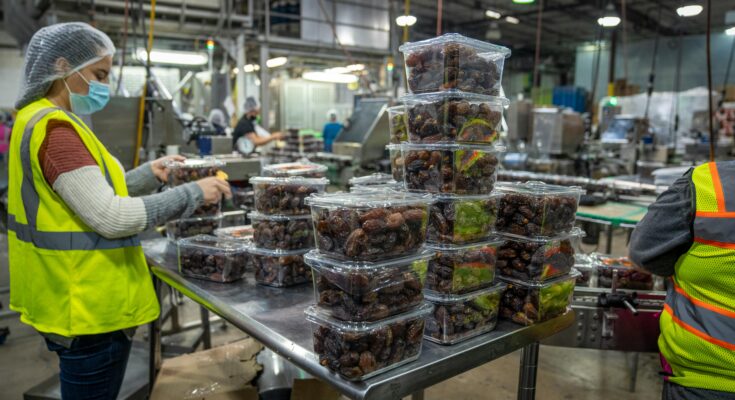Italy’s thriving food industry offers a wide range of employment opportunities, and one of the most in-demand roles for foreign workers is in food packing. From pasta factories in Parma to olive oil producers in Tuscany, food packing jobs are essential to Italy’s globally recognized food export market. These jobs are often available year-round and offer stable work for individuals seeking employment in Italy.
In this guide, we’ll explore everything you need to know about food packing jobs in Italy, including job types, visa requirements, salaries, and how to apply.
Visa and Work Permit Requirements for Foreign Workers
For non-EU citizens who wish to work in Italy’s food packing industry, securing the appropriate visa and work permit is crucial. Most foreign workers apply for the Subordinate Work Visa (Lavoro Subordinato), which requires a valid job offer from an Italian employer.
Once you have a confirmed job offer, your employer will apply for work authorization (Nulla Osta). After it’s approved, you can apply for a work visa at your local Italian consulate. Once you arrive in Italy, you must apply for a residence permit (Permesso di Soggiorno) within 8 days to complete your legal work status.
In some cases, food packing jobs may also be available under Italy’s Decreto Flussi, which allows seasonal and non-seasonal foreign workers to enter the country for specific industries, including food processing.
Types of Food Packing Jobs Available in Italy
The food packing industry in Italy includes a wide variety of job roles depending on the type of food being processed and packed. Some of the most common positions include:
Factory Line Packing
Large factories producing pasta, cheese, canned tomatoes, sauces, and baked goods hire packing staff to work on assembly lines. Workers handle packaging, labeling, and quality control to ensure products meet export standards.
Meat and Seafood Packing
Processing plants hire workers to clean, slice, pack, and label meat, poultry, and seafood products. These jobs may involve cold storage environments and strict hygiene standards.
Fruit and Vegetable Packing
Fresh produce companies hire workers to sort, wash, and package fruits and vegetables for domestic and international markets. This type of work may also be connected to agricultural harvest seasons.
Dairy Product Packing
Dairy factories require workers to package cheese, milk, butter, and yogurt. These jobs involve operating packing machines, checking expiration dates, and ensuring proper storage.
Bakery and Confectionery Packing
Factories that produce biscuits, chocolates, pastries, and other sweets hire workers to package products for retail distribution.
Where Are Food Packing Jobs Located?
Food packing jobs are spread across various regions of Italy, depending on the specialty of the area:
-
Parma & Emilia-Romagna: Famous for pasta, cheese (Parmesan), and cured meats.
-
Lombardy: Home to large dairy factories and food processing plants.
-
Veneto: Known for fresh produce, baked goods, and seafood processing.
-
Puglia & Sicily: Strong agricultural sectors for fruit, vegetables, and olive oil production.
-
Tuscany: Renowned for olive oil, wine, and high-quality food products.
Major cities like Milan, Bologna, Turin, and Naples also have industrial food processing zones where many packing facilities are located.
Basic Requirements for Food Packing Jobs
Although food packing jobs are generally entry-level, employers do expect workers to meet certain requirements:
-
Valid Work Visa and Residence Permit: Legal documentation is mandatory.
-
Physical Fitness: The job often involves standing, lifting, and repetitive hand movements.
-
Attention to Hygiene: Food safety regulations require workers to maintain high hygiene standards.
-
Basic Italian Language Skills: While not always required, understanding basic Italian is helpful for following instructions and safety protocols.
-
Willingness to Work Shifts: Many factories operate multiple shifts, including nights and weekends.
-
Clean Criminal Record: Background checks may be part of the hiring process.
How to Find Food Packing Jobs in Italy
Foreign workers can search for food packing jobs through multiple channels:
1. Online Job Portals:
Websites such as Indeed Italia, Subito.it, Monster.it, Jobrapido, and LinkedIn often list packing jobs.
2. Company Websites:
Many large food companies post job openings directly on their websites. Examples include Barilla, Parmalat, Ferrero, and Lavazza.
3. Recruitment Agencies:
Agencies like Adecco, Manpower, Randstad, and Gi Group often have contracts with food processing companies.
4. Government Programs:
Under the Decreto Flussi, some food packing jobs are offered to non-EU seasonal and non-seasonal workers.
5. Local Connections:
Many foreign workers find opportunities through networking, community groups, or referrals from friends already working in Italy.
Salary Expectations for Food Packing Jobs in Italy
Salaries for food packing jobs in Italy vary depending on the type of work, the region, and the employer. On average:
-
Entry-Level Workers: €900 – €1,200 per month.
-
Experienced Packers or Machine Operators: €1,300 – €1,600 per month.
-
Supervisors or Quality Control Staff: €1,700 – €2,000 per month.
In addition to wages, some employers offer overtime pay, meal allowances, transportation assistance, and in some cases, accommodation for foreign workers.
Cost of Living for Food Packing Workers
The cost of living in Italy depends largely on the location:
-
Rent: €400 – €700 per month in smaller towns or rural areas.
-
Utilities: €50 – €120.
-
Groceries: €150 – €250.
-
Transportation: €30 – €70.
-
Personal Expenses: €50 – €100.
Many workers save money by sharing accommodations with coworkers, especially if housing is not provided by the employer.
Working Conditions and Responsibilities
Food packing jobs typically involve:
-
Operating packing machines.
-
Weighing, sealing, and labeling products.
-
Checking product quality and expiration dates.
-
Following hygiene and food safety protocols.
-
Cleaning workstations and equipment.
Factories often run multiple shifts, so workers should be prepared for early mornings, late nights, or rotating schedules. The work environment can be noisy or involve cold storage areas, depending on the type of food being packed.
Despite these challenges, many workers find food packing jobs stable and reliable, with opportunities for long-term employment if performance is good.
Language Requirements
While some food packing companies hire foreign workers with minimal Italian knowledge, having basic language skills can greatly improve your job performance and safety. Being able to understand instructions, communicate with supervisors, and read labels or safety signs is important. Many employers offer basic language training to new workers.
Frequently Asked Questions
Can foreigners work in food packing jobs in Italy?
Yes, foreign workers can apply for food packing jobs, provided they secure the appropriate visa and work permit.
Is experience necessary?
Many food packing jobs are entry-level and provide on-the-job training. However, experience may help in securing higher-paying positions.
Are food packing jobs full-time or seasonal?
Both options exist. Many food factories operate year-round, while others hire additional staff during peak seasons.
Do I need to speak Italian?
Basic Italian is recommended, especially for safety and communication purposes, but not always mandatory for entry-level positions.
Are accommodations provided?
Some employers may offer shared housing, while others expect workers to arrange their own accommodations.
Conclusion
Food packing jobs in Italy offer foreign workers a stable, legal, and straightforward path to employment in one of the country’s strongest industries. With steady demand for food products both domestically and internationally, Italy continues to recruit foreign labor to support its food processing sector.
By obtaining the right visa, meeting job requirements, and actively searching for opportunities, you can secure a food packing job in Italy and enjoy a rewarding experience living and working in this beautiful country.



